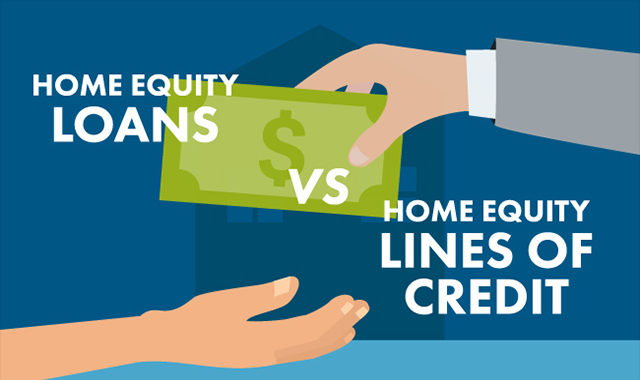Home Equity lines of credit (HELOC’s) and home equity loans are similar methods of borrowing money against the ownership stake you have in your home. A HELOC is a line of credit with a variable interest rate, while a home equity loan is paid back in fixed installments. Both typically allow you to tap up to 80% of the value of our home minus your outstanding mortgage balance.
Key differences between HELOCs and home equity loans:
- A home equity loan is a secured installment loan that allows you to borrow a set amount against your equity at a fixed interest rate and repayment term.
- A home equity line of credit (HELOC) is also a secured debt product. But it is a revolving debt that offers an amount of funds (a replenishable balance, similar to a credit card limit) tied to the level of equity in your home.
Home equity loans come with a fixed interest rate and repayment term. So, your monthly payment will remain the same over the life of the loan. By contrast, HELOCs have a variable interest rate, which can increase or decrease, along with your monthly payments, at preset times.
Some HELOCs come with low introductory rates for a period of time (for example, six months), then flip to a higher, but still fluctuating, rate. However, you will only pay interest on the funds you draw. This is not the case with home equity loans: The interest is calculated on the entire loan amount since you receive the funds in a lump sum.
HELOCs and home equity loans act as second mortgages, using your property as collateral for the debt. So, defaulting on the monthly loan payments means the lender could foreclose your home.
Both funding options allow you to use the funds however you see fit. Some use them to pay for major repairs or renovations, like finishing basement, remodeling a kitchen, or updating a bathroom. Others pay off high-interest credit card debt to save money.
You can expect closing costs whether you choose a home equity loan or HELOC. These expenses should be considered when deciding which option is best for your financial situation.
Pros and cons of a home equity loan.
Advantages:
- You will have a fixed interest rate and predictable monthly payment.
- You will get all of the loan proceeds at closing and can spend them however you see fit.
- The interest paid on the loan might be tax-deductible. Contact a tax adviser for more information.
Disadvantages:
- You will need to know exactly how much you want to borrow. If you do not you might end up with more or less than you need, which means you will either be stuck repaying the portion you did not use plus interest or need to borrow more money.
- You will need a sufficient level of home equity to qualify – usually 20%.
- You could lose your home if you fall behind on the loan payments.
- If property values decline, your combined first mortgage and home equity loan might put you “upside down,” meaning you owe more than your home is worth.
Pros and cons of a HELOC.
Advantages:
- You do not have to use (and repay) all of the funds you have been approved for. Interest is charged on the amount you have borrowed, plus interest accrued between payments.
Disadvantages:
- HELOCs have variable rates. In a rising-interest rate environment, which means you will pay more. This unpredictability could wreak havoc on your budget.
- You could lose your home to foreclosure if you default on the loan payments.
Requirements for HELOCs and home equity loans. Each lender has its own eligibility criteria for home equity loans and HELOCs. However, here are some general guidelines to keep in mind:
- Credit score: A credit score of 620 could be enough with some lenders but aim for 700 or higher to have the best approval odds (and get the best interest rates).
- Income: Your income should be consistent and verifiable.
- Debt-to-income (ratio): You will need an acceptable DTI to qualify for funding.
- Equity: Lenders generally allow you to borrow 80% of your home equity, which is the difference between your home’s value and what you owe.
- Appraisal: The lender will require an appraisal to determine how much your home is worth or its fair market value. (Note: The appraisal is arranged by the lender, and the fee is included in the closing costs).
Bottom line on home equity loans and HELOCs
- Home equity loans and HELOCs both allow you to borrow money against your home equity, but they are not the same. Consider the purpose of the funds, how much you need and whether or not you will want to borrow more in the future. Once you decide, get your credit in good shape and shop around to secure the best rate.
Source: Bankrate
